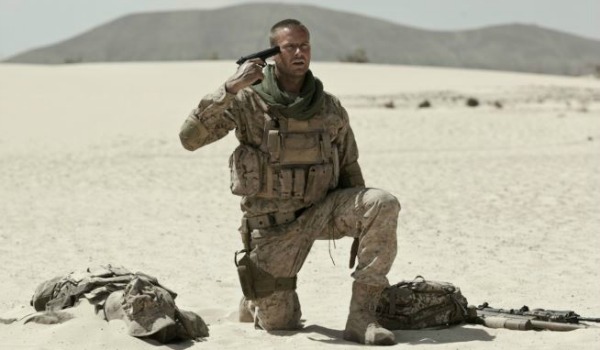Mine was probably a good idea on paper. Both as a taut, gripping thriller that twists and turns in an increasingly surprising manner, and as a way to replicate and cash in on the likes of 127 Hours, Gravity, and The Shallows, each of which put their main characters in impossible to escape circumstances that you just had to see how they got out of.
Like James Franco, Sandra Bullock, and Blake Lively before, Armie Hammer is the actor burdened with being in every scene of Mine, but this time around he has to stay in the exact same position for 90% of the film. That's because, after a failed assassination attempt during a mission in North Africa, Armie Hammer's U.S. Marine Mike Stevens stands and suddenly finds himself trapped on a land mine. If he moves, the mine will explode. But at the same time he is trapped in the middle of the desert, while he also has to battle against psychological and physical fatigue before he can be saved by his comrades in two days.
It's an exacting role for Armie Hammer to play, and he actually becomes more convincing in the part as Mine progresses and as Mike Stevens' struggles become more intense and drastic. At first, even when we see him on his sniper mission and in the immediate aftermath of standing on the titular device, there's nothing for Armie Hammer to grab onto to make the character stand-out, especially since writer and directors Fabio Guaglione and Fabio Resinaro's script is drearily contrived. Unfortunately that doesn't change as the film progresses, and even when it delves into Mike's backstory there's no personality or distinct characterization to make him overtly engaging.
And this is one of the many ways in which Mine falls short, because it never gives you enough reasons to care about Mike Stevens' predicament. Its entire opening scene, which sees Stevens deciding against assassinating one of the world's most wanted men, is orchestrated to put us on his side and show us his humanity, but there's an earnestness and simplicity to his decision that renders it mute.
Then when Mike Stevens is actually on the mine, the psychological fights he's confronted with, which includes returning to his fiancée back in the US and his past struggles with his drunk and abusive father, are each immediately recognizably hackneyed, to such an extent that you instantly lose faith in the movie. Even when Mike is presented with tangible confrontations, such as a sandstorm and a pack of cougars that arrive on each of the two nights, the two Fabios don't do enough cinematically to pull us into his strife or increase the tension. Instead, Mike remains motionless on the mine, which saps the film of any momentum or energy, neither of which it's able to generate.
Meanwhile, the instance where Mike is visited by the inhabitants of the nearby town, and then struggles to communicate with them only adds to the increasing frustration. As it's basically akin to when you're in a foreign country, ask for directions, quickly realize that neither of you speak the same language, persist anyway because it would be rude not to, and then just have to walk away still lost. Only Mine's depiction is umpteen times more frustrating because it is supposed to be entertaining.
It also doesn't help that Mine is an ugly film to watch. The searing sun and the endless desert quickly becomes an eyesore, and since nothing else in the film captivates you're left waiting to be put out of your misery. Even its ending, which is the entire reason you've been sat waiting to be surprised or gripped in even a measly manner, is flat and entirely predictable. Which only underlines the fact that Mine was clearly more suited to being a short film. The fact that it's not, and is stretched out way beyond its capabilities, means Mine is a tepid, lifeless, endurance test of a film that you'd gladly spend an eternity in the desert to avoid sitting through again.
Your Daily Blend of Entertainment News


